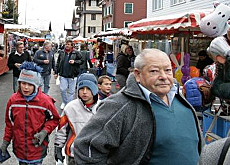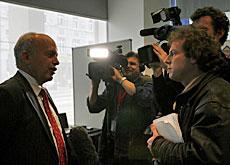Swiss digest election result in different ways

The Swiss have been reacting to Sunday's election in contrasting fashion as a visit to a village in central Switzerland and a walk down Zurich's famed Bahnhofstrasse show.
While the inhabitants of Unteriberg in canton Schwyz were taking stock of the election results and celebrating an annual fair, for people on Zurich’s main shopping street it seemed to be almost business as usual.
The rightwing Swiss People’s Party made large gains in voting for the House of Representatives at the weekend and increased their lead as the strongest grouping in the 200-seat chamber.
Nowhere did it secure a larger share of the vote than in Schwyz, capturing 44.9 per cent – more than double that of its nearest rival, the centre-right Christian Democrats.
In Unteriberg, the margin of victory was even more pronounced, with nearly eight out of ten votes cast for the rightwing group.
“I voted conservatively,” says one man. When questioned he acknowledged – like most other people – that he chose the People’s Party because of its hardline stance on immigration.
“Foreigners who aren’t here to work have no right to be here. I’m in favour of foreigners who live and work here and are well integrated, because we need immigrants.”
Annual cattle fair
A visitor could be forgiven for thinking Unteriberg was celebrating the People’s Party victory by taking to the streets. The village was actually holding its annual cattle fair on Monday.
“The People’s Party best represents my views – especially regarding immigration policy,” says a younger man selling grilled sausages from the stall of the local shooting club. “Foreigners aren’t a big problem in this village but it’s a real concern in places near here.”
The fact that non-Swiss are a barely visible minority in Unteriberg – accounting for only five per cent of the population of 2,340 inhabitants – is proof of the People’s Party success at making crime and immigration the overriding election issue.
Not a single person approached by swissinfo mentioned that it had been won over by the party’s other promises such as lower taxes or greater regional autonomy.

More
Swiss People’s Party
Staunchly Catholic
This is surprising since Unteriberg, in a staunchly Catholic canton, is representative of rural Switzerland.
The locals are fiercely independent – and in Schwyz’s case – proud of the key role their canton played in the creation of the fledgling Swiss state more than 700 years ago.
The only woman who was willing to disclose how she voted said she chose the centre-right Christian Democrats – traditionally the strongest party in Catholic areas like this one.
“The People’s Party is not a bad choice but we have a large family and we think the Christian Democrats have the best family policies,” the woman said.
But Christian Democrat voters were in the minority, and supporters of other parties even rarer.
“Business as usual”
The mood was much different in Zurich, Switzerland’s financial hub and largest city. People along Bahnhofstrasse were prepared to speak their minds, even though there was a definite feeling of “it’s business as usual.”
A young saleswoman told swissinfo she thought the results went in favour of the People’s Party because of its policy towards foreigners, warning that if Switzerland continued to shift to the right, nothing good would come of it.
“I am not happy with the way the voting went so I can understand people who criticise Switzerland, but I think they should mind their own business,” she added though.
An 84-year-old passer-by was not particularly concerned by negative foreign press reports about Switzerland before the election and didn’t think the result would change anything.
“I don’t think Switzerland’s image abroad has been damaged – some people will think it’s better and others will think it’s worse. I don’t think it will make any difference at all,” he commented.
No appeal
An officer worker admitted she did not vote because none of the political parties was saying anything that appealed to her.
“I am not going to vote for one party because they don’t like foreigners or they want to save the environment. These arguments have a place but they do not mean anything to my daily life.
A stroll down Bahnhofstrasse would not be complete without asking what the local bankers have to say. True to form, they appeared more concerned about Switzerland as a financial centre than politics.
“What concerns me is what foreigners think of our banks not what they think of our politicians. The image of Swiss banks abroad is excellent and that will remain unchanged despite the slight changes in the political scene,” one commented.
His view was supported by another banker swissinfo met along the street.
“I don’t think the result of the vote will have much impact on Switzerland’s financial centre because it largely runs itself without interference from politicians.
“Politicians rarely – if at all – make dramatic changes in a short space of time so the market will carry on along its successful path.”
swissinfo, Dale Bechtel in Unteriberg and Matthew Allen on Zurich’s Bahnhofstrasse
The rural village in the central canton of Schwyz has a population of 2,340 including 135 foreign residents.
One in four people in the village works either in agriculture or in forestry.
With a population of 138, 693, canton Schwyz is entitled to send four politicians to the House of Representatives. Its parliamentarians have all been re-elected – two from the People’s Party, one from the Christian Democrats and one from the Social Democrats.
Schwyz was one of Switzerland’s three founding cantons. In 1291, the three small territories formed a military alliance to throw off the yoke of the Habsburg rulers. The German name for Switzerland – Schweiz – is derived from Schwyz.
The city, once called Turicum, is the largest in Switzerland, with a population of 371,767. Thirty per cent of the registered inhabitants of Zürich are foreigners.
Since the reformation led by Huldrych Zwingli, Zurich has remained the centre and stronghold of Protestantism in Switzerland.
It is Switzerland’s commercial centre and home to multinational banking and insurance companies.
According to several surveys in 2006 and 2007, Zürich was named the city with the “best quality of life” in the world.

In compliance with the JTI standards
More: SWI swissinfo.ch certified by the Journalism Trust Initiative












You can find an overview of ongoing debates with our journalists here . Please join us!
If you want to start a conversation about a topic raised in this article or want to report factual errors, email us at english@swissinfo.ch.